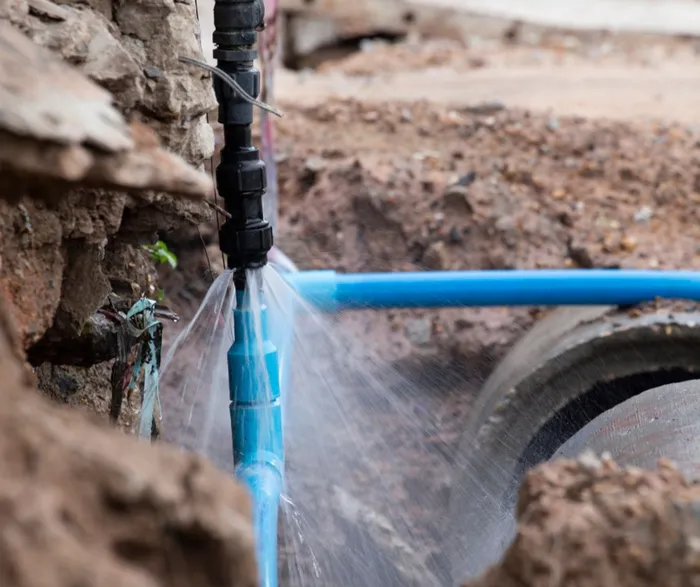
Burst pipes and neglected infrastructure symbolise the growing water crisis facing communities across South Africa.
Image: File
South Africa is on the brink of a full-blown water crisis, with aging infrastructure, weak governance, and chronic underinvestment converging to create a perfect storm.
Across the country, residents are facing dry taps, unreliable supply, and repeated pipe bursts, all symptoms of a system buckling under years of neglect.
And while national, provincial, and municipal governments scramble to showcase improvements, engineering experts and civil society are raising alarm bells.
More than 40% of the water produced and supplied to over 80% of the population is lost before it even reaches households, either through leaks, meter under-readings, theft, or burst pipes.
This is according to the South African Institution of Civil Engineering (SAICE), which has warned that mismanagement of water infrastructure is becoming an economic and environmental time bomb.
"The imperative to fix and renew aged and defective infrastructure cannot be overemphasised," said SAICE Advocacy Committee Chair Wynand Dreyer.
“Our statistics on non-revenue water tell a damning story of neglect. We desperately need to see these numbers turned around.”
The City of Cape Town is aggressively investing in maintenance.
In the current financial year, it has allocated R523 million towards replacing old water and sanitation infrastructure, with 44,659 metres of water pipes and 89,454 metres of sewer pipes already replaced since July 2024.
“We prioritise proactive maintenance, rehabilitation, and replacement of our water and sewer infrastructure to ensure a continuous and reliable water supply and sanitation works for our residents,” said Zahid Badroodien, the City’s Mayoral Committee Member for Water and Sanitation.
The City’s approach includes pressure-reducing valves (PRVs), zero-pressure testing, and step-testing to manage water pressure and avoid pipe bursts. However, this work occasionally results in temporary disruptions.
“It is not possible to predict which areas or streets will experience disruptions,” the City said, acknowledging the inconvenience caused.
Still, residents are skeptical. Years of over-promised and under-delivered services have eroded public trust, according to Ferrial Adam from civil society watchdog WaterCan.
“The lack of accountability and transparency has completely eroded the trust between people and government,” she said.
“People take water shutdown notices with a pinch of salt because they’ve been let down too many times.”
Adam warned that many municipalities, especially in Gauteng and the Eastern Cape, are failing to maintain even the basic standards of service delivery.
In Johannesburg, the water infrastructure is “falling apart,” with high levels of leakage and pollution from wastewater treatment works into rivers like the Klip.
“Despite bigger budgets, they’re not spending enough on maintenance,” she added.
Cape Town stands out as one of the few cities rated “Excellent” in the Department of Water and Sanitation’s most recent No Drop report.
With a 92% score, it ranks among only two municipalities nationwide to earn such recognition.
The report evaluates municipalities on physical water losses, infrastructure upkeep, metering efficiency, and revenue collection.
But the broader national picture is bleak.
According to the Department of Water and Sanitation, South Africa must invest over R90 billion annually for the next decade to repair and upgrade its water systems.
Yet in reality, actual spending has fallen drastically short. Between 2018 and 2022, only about R17 billion was spent each year. Even the increased R69.3 billion budget for 2023–2025 is nearly R200 billion shy of what is needed.
This chronic underfunding has real consequences. Dysfunctional wastewater treatment plants discharge untreated sewage into rivers and oceans, increasing purification costs and threatening ecosystems.
SAICE warns that such environmental degradation is no longer an isolated issue but part of a wider collapse in infrastructure.
“If the system is not robust, corruption, theft, and vandalism remain the cancer of the system,” said SAICE’s Segomotso Kelefetswe.
He called for qualified, professionally registered engineers to lead infrastructure management, and urged government to embrace Public-Private Partnerships (PPPs) as a way to address the funding and skills gap.
Indeed, PPPs are gaining traction as a potential lifeline.
The Department of Water and Sanitation, together with the Development Bank of Southern Africa, is pursuing partnership models that bring in private sector expertise and funding.
Deputy Minister of Water and Sanitation, Sello Seitlholo, recently reaffirmed this vision during a regional water investment summit in Lesotho.
“Our shared future demands that we invest boldly and wisely in securing this most precious resource,” Seitlholo said.
“Investing in water is not just a necessity; it is a generational imperative.”
Seitlholo announced that South Africa would host the Africa Water Investment Summit in August 2025, with water financing set to take centre stage under South Africa’s G20 Presidency.
He also highlighted upcoming reforms aimed at creating regulatory certainty and streamlining the project pipeline to attract more private-sector involvement.
Still, experts caution that no amount of investment will succeed without accountability and operational capacity at the local level.
“Until we see people being charged or fired, municipalities are going to carry on as they have been doing,” said Adam.
For communities, the burden of action remains heavy.
WaterCan encourages residents to report leaks, test water quality, and pressure municipalities to act. But civic action alone cannot fix what decades of neglect have broken.
As the taps run dry and the trust runs thinner, one thing is clear: South Africa’s water crisis is not just about pipes, it’s about governance, credibility, and the political will to rebuild what’s been eroded.
IOL News
Get your news on the go, click here to join the IOL News WhatsApp channel.
Related Topics:
